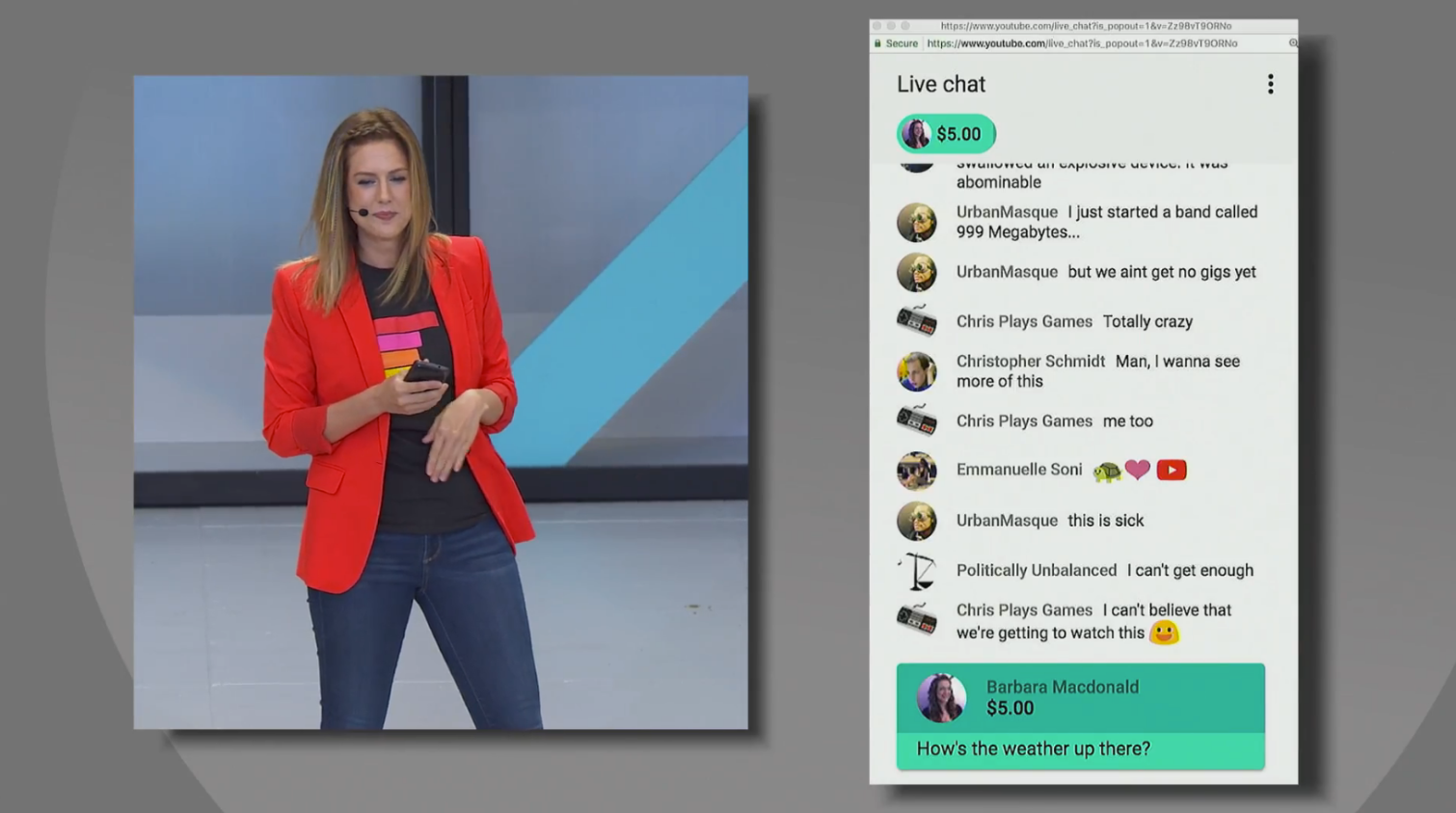YouTube's Super Chat Is Bad for the Internet
YouTube’s Super Chat feature will prioritize the speech of the rich over everyone else, and fetishize vloggers to an uncomfortable degree.
All speech is not equal, especially if it's on YouTube. CEO Susan Wojcicki said at Google I/O that the site is different from traditional media because it serves as a “two-way conversation,” allowing people to interact with those they watch.
Then, product manager Barbara Macdonald stepped on stage and proved that’s not true anymore. She showed off Super Chat, a tool for viewers to have their message highlighted during a livestream and pinned to the top of the stream for up to five hours. It’s not a brand new tool (it launched in January), but the company wanted to show off new APIs to make videos interactive to those who pay.

YouTube says that this makes sure that your chat “stands out from the crowd to get even more of your favorite creator’s attention,” but it won’t be because it’s in bright green; it’s because you paid them.
Now, don’t get me wrong here. Professional YouTubers work hard, and they deserve to earn a living. But this form of payment goes against the spirit of the Internet: that all speech is equal.
Not everyone can afford to give $5 (or more! On stage, Macdonald gave $500 to the Slow Mo Guys), but everyone with internet access can watch YouTube. Are the voices of people who have less disposable income less important?
That’s not to say YouTubers are aiming to leave anyone out, but it’s far easier to notice and respond to a message when they’re huge and colorful, and it’s hard to ignore them when there’s money attached. You can only respond to so many comments, after all. The voices of those with money are the voices that get heard.
MORE: The 10 Best YouTube Videos You Missed This Week
This also fetishizes YouTubers to a degree that can be uncomfortable. As TechCrunch suggested back in January, it’s somewhat similar to chat systems that live porn cam websites have used for a long time. You’re paying for attention, for a connection that’s not there when the camera shuts off.
YouTube isn’t the only site with a system like this. Twitch, a streaming service aimed at people playing video games, has a system called cheering in which audience members pay for emoticons that draw attention to their messages. It’s kind of gross, but the intent is slightly different — to celebrate during awesome moments (think like a tip jar for headshots in Call of Duty or goals in Rocket League). YouTube’s is purely for attention from the people you admire who make videos.
Earlier this month, Kotaku’s Cecilia D’Anastasio wrote an article about people who fall in love with Twitch streamers, and those who took that love further than is appropriate. Surely, there are people who believe they have connections with YouTubers, too, and they’ll be willing to pay to further those feelings.
The whole idea, paying for an e-celebrity's attention, is bad for the internet and its users. It’s a slow step in making sure the rich’s speech have more influence, and it can help further unhealthy obsessions with celebrity. If this is how YouTube is going to foster “two-way” conversation, it will leave a whole lot of people sitting on the sidelines.
Sign up to get the BEST of Tom's Guide direct to your inbox.
Get instant access to breaking news, the hottest reviews, great deals and helpful tips.
Andrew E. Freedman is an editor at Tom's Hardware focusing on laptops, desktops and gaming as well as keeping up with the latest news. He holds a M.S. in Journalism (Digital Media) from Columbia University. A lover of all things gaming and tech, his previous work has shown up in Kotaku, PCMag, Complex, Tom's Guide and Laptop Mag among others.
-
turkey3_scratch Youtube should be rid of all conversations because the comment sections are always the most pure trash filth on the Internet.Reply

